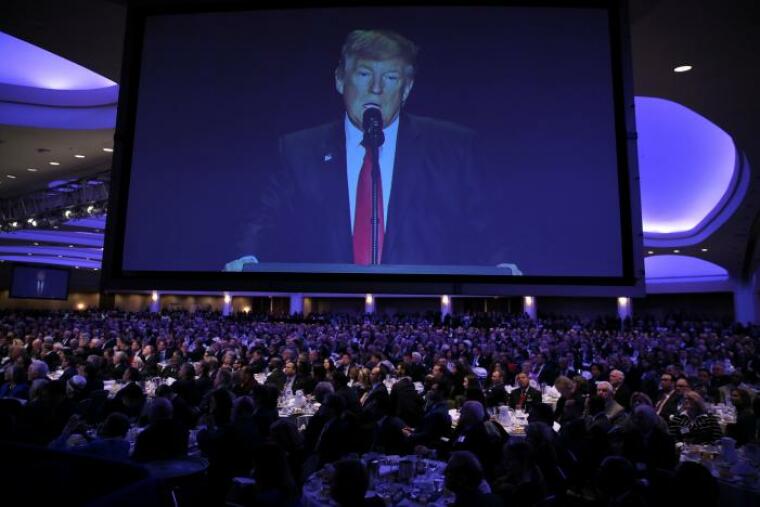Baptist groups oppose repeal of law prohibiting preachers from endorsing politicians

Baptist groups have joined 99 other religious and denominational organizations on April 4 to urge lawmakers to preserve the Johnson Amendment, a law that prohibits churches and other tax-exempt institutions from endorsing or opposing politicians.
Under the 1954 law, churches and charities can lose their tax-exempt status if they engage in partisan campaigning.
During the campaign period, then-candidate Donald Trump had vowed to "totally destroy" the law, claiming that it unfairly restricts the free speech of the clergy. However, a recent survey conducted by the National Association of Evangelicals showed that almost 90 percent of evangelical leaders oppose the idea of clergy endorsing politicians from the pulpit.
A coalition of religious groups has recently written an open letter to Congress to oppose the repeal of the law.
"Houses of worship are spaces for members of religious communities to come together, not be divided along political lines; faith ought to be a source of connection and community, not
division and discord," the letter read in part.
The Alliance of Baptists, American Baptist Churches USA, Association of Welcoming and Affirming Baptists, Baptist Joint Committee for Religious Liberty, Baptist Peace Fellowship of North America, Baptist Women in Ministry, Cooperative Baptist Fellowship, and the New Baptist Covenant were among the groups that joined the coalition.
Amanda Tyler, executive director of the Baptist Joint Committee for Religious Liberty, noted that a broad section of the faith community does not need or want a change in the tax law.
"As soon as the church joins at the hip with a particular candidate or party, its prophetic witness — its ability to speak truth to power and not risk being co-opted by the government — is hindered," said Tyler, who had previously served as an aide to U.S. Rep. Lloyd Doggett (D-Texas).
Tyler and other Baptist leaders were joined by Christian, Muslim, Jewish, Hindu, Sikh, and other faith groups in the April 4 letter, which stated that the current tax code safeguards the integrity of charities as well as the system of campaign finance.
The letter, which was hand-delivered to congressional leaders, maintained that the current law does not restrict religious leaders from personally endorsing candidates or using their pulpit to address moral and political issues of the day. It stated that the law merely prevents a group from being a tax-exempt ministry and a partisan political entity at the same time.
"Partisan politics have no place in our pulpits," said Suzii Paynter, executive coordinator of the Cooperative Baptist Fellowship, according to Baptist News Global.
"In fact, it's the absence of that very thing — partisan politics — that gives us the power to speak with moral authority on issues of the day." she added.
 Christians don't have to affirm transgenderism, but they can’t express that view at work: tribunal
Christians don't have to affirm transgenderism, but they can’t express that view at work: tribunal Archaeology discovery: Medieval Christian prayer beads found on Holy Island
Archaeology discovery: Medieval Christian prayer beads found on Holy Island Presbyterian Church in America votes to leave National Association of Evangelicals
Presbyterian Church in America votes to leave National Association of Evangelicals Over 50 killed in 'vile and satanic' attack at Nigerian church on Pentecost Sunday
Over 50 killed in 'vile and satanic' attack at Nigerian church on Pentecost Sunday Ukrainian Orthodox Church severs ties with Moscow over Patriarch Kirill's support for Putin's war
Ukrainian Orthodox Church severs ties with Moscow over Patriarch Kirill's support for Putin's war Islamic State kills 20 Nigerian Christians as revenge for US airstrike
Islamic State kills 20 Nigerian Christians as revenge for US airstrike Man who served 33 years in prison for murder leads inmates to Christ
Man who served 33 years in prison for murder leads inmates to Christ


 Nigerian student beaten to death, body burned over ‘blasphemous’ WhatsApp message
Nigerian student beaten to death, body burned over ‘blasphemous’ WhatsApp message 'A new low': World reacts after Hong Kong arrests 90-year-old Cardinal Joseph Zen
'A new low': World reacts after Hong Kong arrests 90-year-old Cardinal Joseph Zen Iran sentences Christian man to 10 years in prison for hosting house church worship gathering
Iran sentences Christian man to 10 years in prison for hosting house church worship gathering French Guyana: Pastor shot dead, church set on fire after meeting delegation of Evangelicals
French Guyana: Pastor shot dead, church set on fire after meeting delegation of Evangelicals ‘Talking Jesus’ report finds only 6% of UK adults identify as practicing Christians
‘Talking Jesus’ report finds only 6% of UK adults identify as practicing Christians Mission Eurasia ministry center blown up in Ukraine, hundreds of Bibles destroyed: 'God will provide'
Mission Eurasia ministry center blown up in Ukraine, hundreds of Bibles destroyed: 'God will provide' Church holds service for first time after ISIS desecrated it 8 years ago
Church holds service for first time after ISIS desecrated it 8 years ago Burger King apologizes for 'offensive campaign' using Jesus' words at the Last Supper
Burger King apologizes for 'offensive campaign' using Jesus' words at the Last Supper Uganda: Muslims abduct teacher, burn him inside mosque for praying in Christ’s name
Uganda: Muslims abduct teacher, burn him inside mosque for praying in Christ’s name